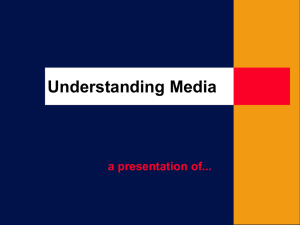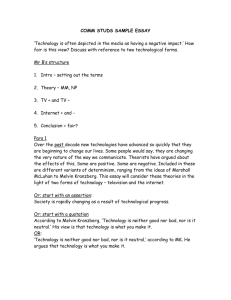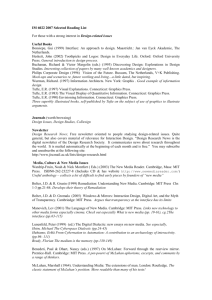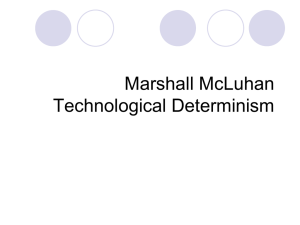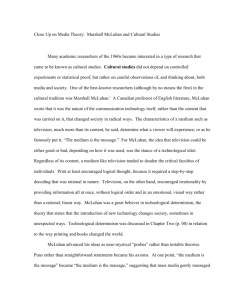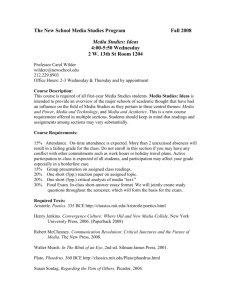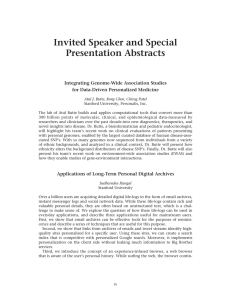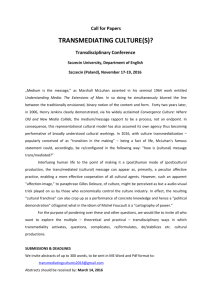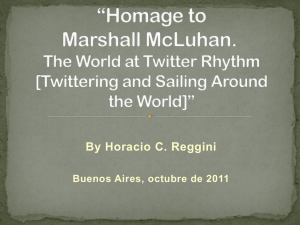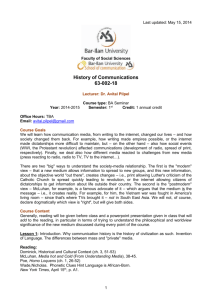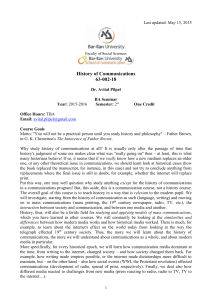Luke Martin ENG110Z Martin 15 May 2015 Self
advertisement
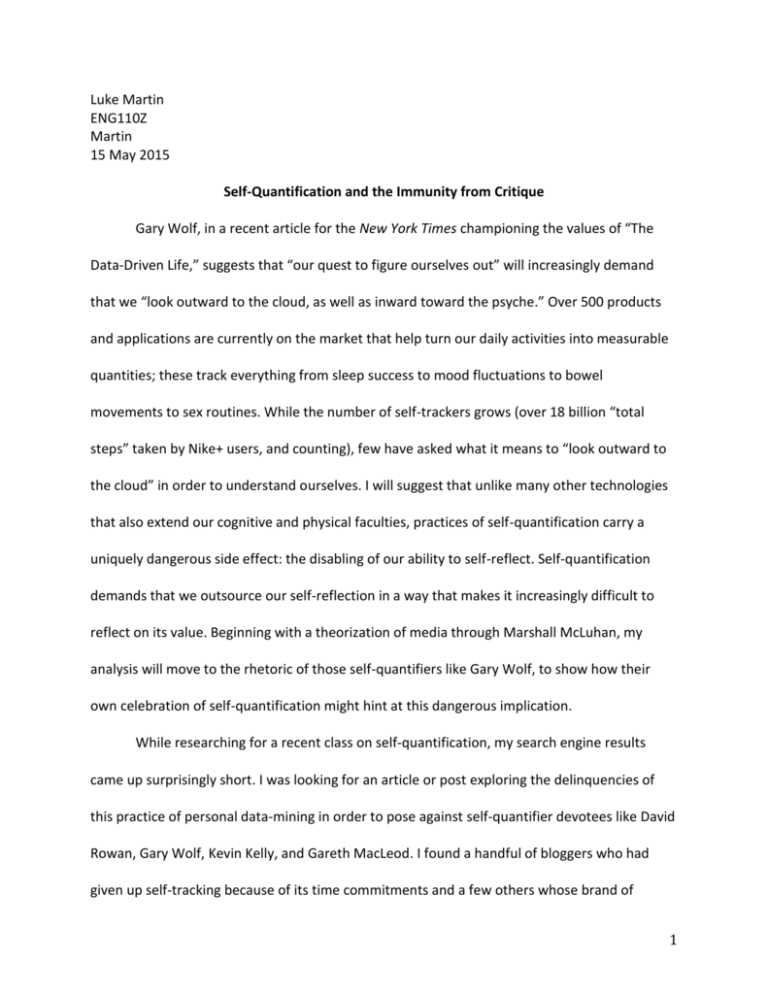
Luke Martin ENG110Z Martin 15 May 2015 Self-Quantification and the Immunity from Critique Gary Wolf, in a recent article for the New York Times championing the values of “The Data-Driven Life,” suggests that “our quest to figure ourselves out” will increasingly demand that we “look outward to the cloud, as well as inward toward the psyche.” Over 500 products and applications are currently on the market that help turn our daily activities into measurable quantities; these track everything from sleep success to mood fluctuations to bowel movements to sex routines. While the number of self-trackers grows (over 18 billion “total steps” taken by Nike+ users, and counting), few have asked what it means to “look outward to the cloud” in order to understand ourselves. I will suggest that unlike many other technologies that also extend our cognitive and physical faculties, practices of self-quantification carry a uniquely dangerous side effect: the disabling of our ability to self-reflect. Self-quantification demands that we outsource our self-reflection in a way that makes it increasingly difficult to reflect on its value. Beginning with a theorization of media through Marshall McLuhan, my analysis will move to the rhetoric of those self-quantifiers like Gary Wolf, to show how their own celebration of self-quantification might hint at this dangerous implication. While researching for a recent class on self-quantification, my search engine results came up surprisingly short. I was looking for an article or post exploring the delinquencies of this practice of personal data-mining in order to pose against self-quantifier devotees like David Rowan, Gary Wolf, Kevin Kelly, and Gareth MacLeod. I found a handful of bloggers who had given up self-tracking because of its time commitments and a few others whose brand of 1 humanism fears any gadget-ization or metric-ization of the human.1 This surprising void forced me to confront a possibility inherent within the logic and practice of self-quantification: insofar as a critique of self-quantification would require a self-reflection on its personal consequences, perhaps it alters our ability to self-reflect. Before addressing the specific effects of self-quantification technology, we need to establish the premise that technologies have the capacity to deeply transform our cognitive and physical capacities and tendencies. In Understanding Media (1964), Marshall McLuhan presents his version of the “extension thesis.” In its most basic form, this thesis suggests that every technology or media is an extension of some human physical or cognitive ability.2 McLuhan adds a term which complicates this simple definition: “Any invention or technology is an extension or self-amputation of our physical bodies, and such extension also demands new ratios or new equilibriums among the other organs and extensions of the body” (45). We cannot stop at our definition of technologies as extensions; each is also an amputation. Just as they enable or augment some faculty through extension, they also disable some aspect of that faculty. What faculty does self-quantification technology augment? When asked about the development of these technologies in an interview with Emily Singer for MIT Technology 1 One of these critiques takes the form of a poem published in a surprising place, the veritable temple of personal data-mining, quantifiedself.com. In it, Alexandra Carmichael describes how tracking became an “instrument of self torture.” A more sustained critique that particularly addresses the time commitments and over-complexities in self-tracking can be found in Emily Singer’s “Quantifying Myself: Self-Tracking Failures.” 2 Many mistakenly think of the extension thesis as stemming directly from McLuhan’s work. However, the same basic idea has a long range of precedents, from Karl Marx’s discussion of machinery in Capital (see, for example, chapter on “Machinery and Large-Scale Industry”) to Ralph Waldo Emerson’s claim in the essay “Works and Days”: “All the tools and engines on earth are only extensions of its limbs and senses.” 2 Review, Dave Marvit, Vice President of Fujitsu Labs, responded: “When we think about the five senses, there have been technologies to augment each of them. But what is sort of fascinating, technologies haven’t augmented this sixth sense, if you will, which is our own sense of selfawareness. There haven’t been technologies to tell us when we’re hungry or drowsy or stressed. And self-tracking is all about that. It’s all about augmenting this additional sense of self-awareness.” If we are to take McLuhan’s suggestion above seriously, Dave Marvit’s optimism should be tempered. Before becoming quantified selves, arming ourselves with an array of new self-reflective contraptions, we should ask: what is amputated after selfawareness is extended? … 3 Works Cited Carmichael, Alexandra. “Why I Stopped Tracking.” Quantified Self. Web. 5 Apr. 2010. < http://quantifiedself.com/2010/04/why-i-stopped-tracking/ > Emerson, Ralph Waldo. “Works and Days.” The Works of Ralph Waldo Emerson (RWE.org). Web. 27 Nov. 2012. < http://www.rwe.org/complete-works/vii-society-andsolitude/chapter-vii-works-and-days.html > Singer, Emily. “The Measured Life.” Video interview with Dave Marvit. MIT Technology Review. Web. 21 June 2011. < http://www.technologyreview.com/featuredstory/424390/themeasured-life/ > ---. “Quantifying Myself: Self-Tracking Failures.” MIT Technology Review. Web. 22 June 2011. < http://www.technologyreview.com/view/424441/quantifying-myself-self-trackingfailures/ > Marx, Karl. Capital Vol. 1. Trans. Ben Fowkes. New York: Vintage Books, 1977. Print. McLuhan, Marshall. Understanding Media. Cambridge: MIT Press, 1995. Print. Wolf, Gary. “The Data-Driven Life.” The New York Times. Web. 28 April 2010. < http://www.nytimes.com/2010/05/02/magazine/02self-measurementt.html?pagewanted=all&_r=0 > 4
